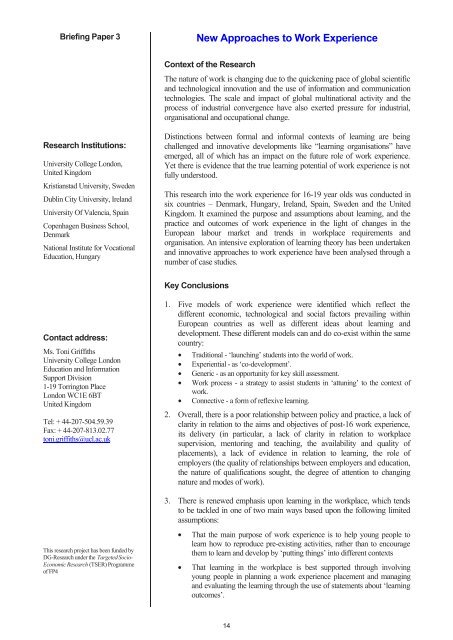briefing papers for policy makers
briefing papers for policy makers
briefing papers for policy makers
You also want an ePaper? Increase the reach of your titles
YUMPU automatically turns print PDFs into web optimized ePapers that Google loves.
Briefing Paper 3<br />
Research Institutions:<br />
University College London,<br />
United Kingdom<br />
Kristianstad University, Sweden<br />
Dublin City University, Ireland<br />
University Of Valencia, Spain<br />
Copenhagen Business School,<br />
Denmark<br />
National Institute <strong>for</strong> Vocational<br />
Education, Hungary<br />
Contact address:<br />
Ms. Toni Griffiths<br />
University College London<br />
Education and In<strong>for</strong>mation<br />
Support Division<br />
1-19 Torrington Place<br />
London WC1E 6BT<br />
United Kingdom<br />
Tel: + 44-207-504.59.39<br />
Fax: + 44-207-813.02.77<br />
toni.griffiths@ucl.ac.uk<br />
This research project has been funded by<br />
DG-Research under the Targeted Socio-<br />
Economic Research (TSER) Programme<br />
of FP4<br />
New Approaches to Work Experience<br />
Context of the Research<br />
The nature of work is changing due to the quickening pace of global scientific<br />
and technological innovation and the use of in<strong>for</strong>mation and communication<br />
technologies. The scale and impact of global multinational activity and the<br />
process of industrial convergence have also exerted pressure <strong>for</strong> industrial,<br />
organisational and occupational change.<br />
Distinctions between <strong>for</strong>mal and in<strong>for</strong>mal contexts of learning are being<br />
challenged and innovative developments like “learning organisations” have<br />
emerged, all of which has an impact on the future role of work experience.<br />
Yet there is evidence that the true learning potential of work experience is not<br />
fully understood.<br />
This research into the work experience <strong>for</strong> 16-19 year olds was conducted in<br />
six countries – Denmark, Hungary, Ireland, Spain, Sweden and the United<br />
Kingdom. It examined the purpose and assumptions about learning, and the<br />
practice and outcomes of work experience in the light of changes in the<br />
European labour market and trends in workplace requirements and<br />
organisation. An intensive exploration of learning theory has been undertaken<br />
and innovative approaches to work experience have been analysed through a<br />
number of case studies.<br />
Key Conclusions<br />
1. Five models of work experience were identified which reflect the<br />
different economic, technological and social factors prevailing within<br />
European countries as well as different ideas about learning and<br />
development. These different models can and do co-exist within the same<br />
country:<br />
• Traditional - ‘launching’ students into the world of work.<br />
• Experiential - as ‘co-development’.<br />
• Generic - as an opportunity <strong>for</strong> key skill assessment.<br />
• Work process - a strategy to assist students in ‘attuning’ to the context of<br />
work.<br />
• Connective - a <strong>for</strong>m of reflexive learning.<br />
2. Overall, there is a poor relationship between <strong>policy</strong> and practice, a lack of<br />
clarity in relation to the aims and objectives of post-16 work experience,<br />
its delivery (in particular, a lack of clarity in relation to workplace<br />
supervision, mentoring and teaching, the availability and quality of<br />
placements), a lack of evidence in relation to learning, the role of<br />
employers (the quality of relationships between employers and education,<br />
the nature of qualifications sought, the degree of attention to changing<br />
nature and modes of work).<br />
3. There is renewed emphasis upon learning in the workplace, which tends<br />
to be tackled in one of two main ways based upon the following limited<br />
assumptions:<br />
• That the main purpose of work experience is to help young people to<br />
learn how to reproduce pre-existing activities, rather than to encourage<br />
them to learn and develop by ‘putting things’ into different contexts<br />
• That learning in the workplace is best supported through involving<br />
young people in planning a work experience placement and managing<br />
and evaluating the learning through the use of statements about ‘learning<br />
outcomes’.<br />
14


